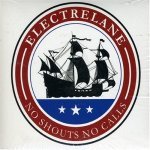
Electrelane No Shouts, No Calls
(Too Pure)
If you've heard of Electrelane before, you know that they've been lumped in with a lot of other girl groups - Sleater-Kinney, The Gossip, Le Tigre - and may have written them off for that very reason. If you've listened to Electrelane before, you know that they sound a whole lot more like Stereolab, that their music doesn't seem to be at all entwined with their politics, and that, if anything, they are just a watered-down version of the aforementioned riot rock royalty, jumping frenetically from style to style without anything solid to grasp. Whether you liked them or not, Electrelane never quite stuck to your ribs.
In a way, Electrelane's latest album is no flagrant departure from their previous releases. There is nothing new or noteworthy about the instrumentation or vocals - in fact, one could argue that the whole album is entirely predictable. But even to the casual listener, No Shouts, No Calls stands alone from the others, despite all the similarities from one album to the next. As a subtle, quiet culmination of its forebears, it completely extricates itself from all of the labelling Electrelane has garnered in the past. And it's very, very good.
There is something about lo-fi music that makes it so much more personal than its highly-refined rivals. You can picture the band in the same room, in your basement, on your level, unpretentious. Electrelane has never boasted particularly polished production, but No Shouts has a certain dreamy graininess that, to my mind, brings the listener closer in. We hear a wide range of instruments on this record - violins, organ, banjo - but the melodies are simple: Electrelane isn't showing off. It's easy to close in and concentrate on any individual line. This simplicity, oddly, gives the music a pleasing multi-dimensionality. With the notable exception of the guitar riffs and solos (which sound uncannily like those from earlier Sleater-Kinney recordings, particularly on After the Call) the record is terrifically ethereal, with breathy, Nico-esque vocals blending into the instrumentation and loungy beats (think of a mixture between Saturday Looks Good to Me's underwater-pop and Stereolab or Belle and Sebastian's mod crooning). It's got a bit of the pursed-lip sixties chic, but with so much less kitsch-appeal; this album is nothing if not sincere.
It's difficult to pick a standout from such a cohesive grouping, but for the dabblers, I highly recommend Tram 21, a spacey instrumental track (although it should be said that even those cuts with lyrics sound so well-blended that they may as well be instrumental) that is just as listenable as it is danceable. It's the perfect example of the layering of simple melodies (I'm especially fond of the bass line, here), one by one, to form a surprisingly classic-sounding rock 'n' roll jam.
It's a collection of tiny, almost unnoticeable changes that make this record so much more solid than its predecessors. Axes and, to a lesser extent, The Power Out, showcased the variation in style that Electrelane is capable of, but resulted in somewhat disjointed efforts - a group of songs rather than an album. Electrelane has developed a remarkable sound all its own. No Shouts, No Calls, for all its sameness, is a perfect whole - simple, satisfying and familiar from first to last.
7 June, 2007 - 07:27 — Gabbie Nirenburg